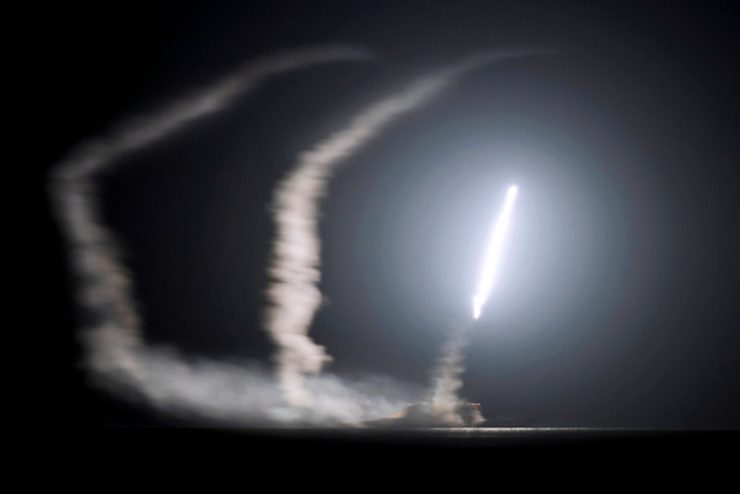SUMMARY
This is AI generated summarization, which may have errors. For context, always refer to the full article.

UNITED NATIONS – The United States bombed Islamic State-controlled oil refineries in Syria on Wednesday, September 24, as President Barack Obama recruited more allies to fight the jihadist “network of death.”
US, Saudi and Emirati warplanes broadened their bombardment to target the oil installations in eastern Syria that have helped fund the jihadist group’s brutal rise from rebel faction to alleged global threat.
The strikes came as Obama urged leaders gathered at the UN General Assembly to join his coalition and convinced the Security Council to back a resolution to stem the flow of foreign fighters.
Belgium and the Netherlands committed warplanes to Iraq and Britain said its parliament would vote Friday on following suit.
“The United States of America will work with a broad coalition to dismantle this network of death,” Obama told the UN about the Islamic State group, which has grabbed vast areas of Iraq and Syria.
“Today I ask the world to join in this effort.”
Meanwhile, an ISIS-linked group in Algeria which had demanded France halt its participation in the strikes posted video footage of the execution of an abducted Frenchman.
“We will use our military might in a campaign of air strikes to roll back ISIL,” Obama declared, using the acronym for the former Islamic State of Iraq and the Levant, since renamed the Islamic State.
Overnight Tuesday (September 23) to Wednesday, US air raids targeted ISIS fighters threatening the Kurdish regional capital in Iraq and damaged eight militant vehicles operating in eastern Syria near the Iraqi border.
Then as night fell again on Wednesday, Arab jets joined the US-led bombardment again – as they had on Monday, September 22 – as the target list was expanded to include economic assets.
Oil refineries targeted
The latest round of air raids focused on 12 targets in eastern Syria, where the ISIS extremists control small-scale oil refineries.
“These 12 targets were what we call modular oil refineries,” Pentagon spokesman Rear Admiral John Kirby told CNN.
“They were struck with precision-guided missiles by coalition aircraft. In fact, there were more coalition aircraft in the skies on these particular missions than US (planes),” he said.
Alongside US aviation and cruise missiles, Saudi Arabia, Bahrain, the United Arab Emirates and Jordan have hit targets in Syria and France in Iraq. Qatar is providing logistical support.
At the United Nations, Obama and French President Francois Hollande led international condemnation of the murder of the French hiker, 55-year-old Herve Gourdel, by the ISIS-linked Jund al-Khilifa.
Paris opposed the 2003 US-led invasion of Iraq but has sent Rafale fighters into action over Iraq – but not to the parallel campaign in Syria – and Hollande vowed not to give in to the IS group.
French hostage killed
“The fight against terrorism must continue and be stepped up,” Hollande said.
ISIS militants in Syria had already killed two American journalists and a British aid worker, but Gourdel’s death was the first at the hands of an allied group outside the core area since the US campaign began in early August.
Obama said the United States stood with France and chaired a UN Security Council meeting which unanimously adopted a binding resolution to turn back the flow of foreign fighters heading to Iraq and Syria.
It requires all countries to adopt laws that would make it a serious crime for their nationals to join jihadist groups such as Islamic State and Al-Nusra Front, or risk economic sanctions or military action.
Jordan’s King Abdullah II, whose country is sheltering nearly 1.4 million Syrians, told the UN General Assembly there had to be a collective strategy to defeat militants who threaten global security.
In their capitals, Belgium and the Netherlands said they would each send six F-16 fighter bombers to join the air campaign in Iraq.
Apart from the F-16s, the Netherlands will also deploy 250 military personnel and 130 trainers for the Iraqi military, which was overrun by IS militants in a brutal campaign of beheadings and forced religious conversions.
The Belgian parliament must still approve the move, which follows a formal request from Washington on Tuesday, Defense Minister Pieter De Crem said.
On the sidelines of the assembly, Prime Minister David Cameron said the British parliament would hold an extraordinary session on Friday, September 26, to vote joining the strikes, as requested by Baghdad.
Al Qaeda’s Syrian branch, the Al-Nusra Front – an ISIS rival that has also been targeted – said it was evacuating its bases and positions in the northeastern Syrian province of Idlib.
In New York, Obama hailed the “political vision” and inclusive nature of new Iraqi Prime Minister Haidar al-Abadi as the two leaders met for the first time.
He used his talks with Abadi to portray the new prime minister as the right kind of leader for Iraq as it struggles to expel the ISIS radicals. – Rappler.com
Add a comment
How does this make you feel?
There are no comments yet. Add your comment to start the conversation.